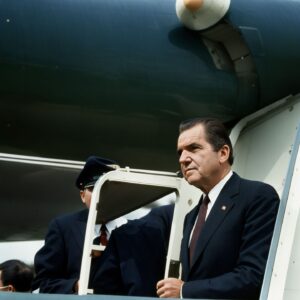On February 21, 1972, President Richard Nixon arrived in Beijing, marking a groundbreaking moment in international diplomacy. His visit to the People’s Republic of China was the first by a sitting U.S. president and a strategic move that reshaped global politics. At a time when Cold War tensions were at their peak, Nixon’s trip signaled the beginning of a new relationship between the two superpowers and a shift in the global balance of power.
For over two decades, the United States and China had been locked in a diplomatic freeze, with little to no formal communication. The Chinese Communist Party, led by Chairman Mao Zedong, had been isolated from the West, while the U.S. remained deeply entrenched in its policy of containment against communism. However, Nixon, known for his staunch anti-communist stance, saw an opportunity to leverage China as a counterbalance to the Soviet Union. With the help of Secretary of State Henry Kissinger, secret diplomatic negotiations paved the way for what Nixon would later call “the week that changed the world.”
During his seven-day visit, Nixon met with both Chairman Mao and Premier Zhou Enlai, engaging in high-level discussions on trade, diplomacy, and geopolitical strategy. The visit was highly symbolic, as Nixon toured the Great Wall and attended cultural events, demonstrating a willingness to bridge the ideological divide. The trip culminated in the Shanghai Communiqué, a joint statement that laid the foundation for future U.S.-China relations. While the two nations still had significant differences, they agreed to pursue peaceful coexistence and economic engagement.
Nixon’s visit had profound and lasting effects. It not only opened diplomatic channels between the U.S. and China but also shifted the global power dynamic, pressuring the Soviet Union to engage in arms control talks. Over time, China emerged as a key player in the global economy, and U.S.-China relations became one of the most critical bilateral relationships of the modern era.
Though Nixon’s presidency ended in scandal with Watergate, his trip to China remains one of his most significant achievements, proving that diplomacy, even between ideological adversaries, can change the course of history.

